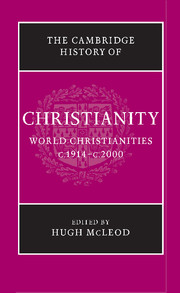Book contents
- Frontmatter
- 1 Introduction
- 2 Being a Christian in the early twentieth century
- PART I INSTITUTIONS AND MOVEMENTS
- PART II NARRATIVES OF CHANGE
- 8 The Great War
- 9 The Christian churches and politics in Europe, 1914–1939
- 10 Latin America, c.1914–c.1950
- 11 African Christianity: from the world wars to decolonisation
- 12 The African diaspora in the Caribbean and Europe from pre-emancipation to the present day
- 13 Christianity in the United States during the inter-war years
- 14 Christian churches in Australia, New Zealand and the Pacific, 1914–1970
- 15 Catholicism and Protestantism in the Second World War in Europe
- 16 The Cold War, the hegemony of the United States and the golden age of Christian democracy
- 17 The religious ferment of the sixties
- 18 The crisis of Christianity in the West: etering a post-Christian era?
- 19 The revolutions in eastern Europe and the beginnings of the post-communist era
- 20 The transformation of Latin American Christianity, c.1950–2000
- 21 Religion and racism: struggles around segregation, ‘Jim Crow’ and apartheid
- 22 Post-colonial Christianity in Africa
- 23 South Asia, 1911–2003
- 24 Christianity in South-East Asia, 1914–2000
- 25 East Asia
- PART III SOCIAL AND CULTURAL IMPACT
- Bibliography
- Index
- References
16 - The Cold War, the hegemony of the United States and the golden age of Christian democracy
from PART II - NARRATIVES OF CHANGE
Published online by Cambridge University Press: 28 March 2008
- Frontmatter
- 1 Introduction
- 2 Being a Christian in the early twentieth century
- PART I INSTITUTIONS AND MOVEMENTS
- PART II NARRATIVES OF CHANGE
- 8 The Great War
- 9 The Christian churches and politics in Europe, 1914–1939
- 10 Latin America, c.1914–c.1950
- 11 African Christianity: from the world wars to decolonisation
- 12 The African diaspora in the Caribbean and Europe from pre-emancipation to the present day
- 13 Christianity in the United States during the inter-war years
- 14 Christian churches in Australia, New Zealand and the Pacific, 1914–1970
- 15 Catholicism and Protestantism in the Second World War in Europe
- 16 The Cold War, the hegemony of the United States and the golden age of Christian democracy
- 17 The religious ferment of the sixties
- 18 The crisis of Christianity in the West: etering a post-Christian era?
- 19 The revolutions in eastern Europe and the beginnings of the post-communist era
- 20 The transformation of Latin American Christianity, c.1950–2000
- 21 Religion and racism: struggles around segregation, ‘Jim Crow’ and apartheid
- 22 Post-colonial Christianity in Africa
- 23 South Asia, 1911–2003
- 24 Christianity in South-East Asia, 1914–2000
- 25 East Asia
- PART III SOCIAL AND CULTURAL IMPACT
- Bibliography
- Index
- References
Summary
Christianity and Cold War
The concept of the Cold War as one of history’s great religious wars, a global conflict between the god-fearing and the godless, derives from the fact that ideology, based on and informed by religious beliefs and values, was central in shaping both perceptions of and responses to the USSR. From a Western religio-political perspective, Marxist atheism was the Achilles’ heel of Soviet communism, which was portrayed as a fanatical pseudo-religion that only a superior spiritual force could resist. The provision of an ideological rationale based on Christianity to justify political actions in the international arena was a continuation of the struggle against Hitler’s New Order, in which Christianity and ideas of social justice had been called into play.
Containment was an ideological call to arms. Britain and America attempted to construct a ‘Western’ doctrine with universal appeal. Beset with difficulties, not least how to reconcile left-leaning Europeans with an America moving rapidly to the right, the project was seen as a blatant propaganda contrivance and poorly received. received. Asked to write a ‘credo’ for Cold War liberalism, Isaiah Berlin responded: ‘I do not think that the answer to communism is a counterfaith, equally fervent, militant, etc.; to begin with, nothing is less likely to create a “faith” than perpetual reiteration of the fact thatwe are looking for one,must find one, are lost without one.’ The historian Daniel Boorstin was sceptical about the ‘un-American demand for a philosophy of democracy’ to use ‘as a weapon against Russia and a prop for our own institutions’.
- Type
- Chapter
- Information
- The Cambridge History of Christianity , pp. 285 - 303Publisher: Cambridge University PressPrint publication year: 2006



